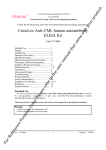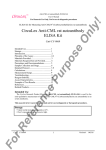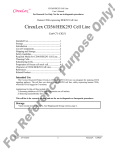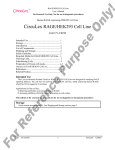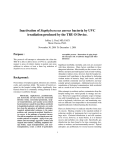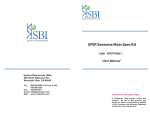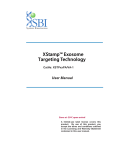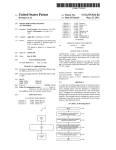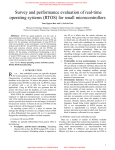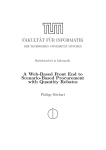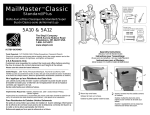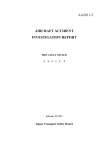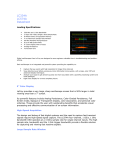Download Data Sheet
Transcript
CircuLex TM CML/Nε-(Carboxymethyl)lysine ELISA Kit User’s Manual For Research Use Only, Not for use in diagnostic procedures ELISA Kit for Measuring CML/Nε-(Carboxymethyl)lysine CircuLex CML/Nε-(Carboxymethyl)lysine ELISA Kit Cat# CY-8066 Intended Use................................................ 1 Storage......................................................... 1 Introduction.................................................. 2 Principle of the Assay.................................. 2 Materials Provided....................................... 3 Materials Required but not Provided........... 3 Precautions and Recommendations.............. 4 Sample Collection and Storage.....................5 Detailed Protocol.......................................... 6-8 Calculations..................................…............ 8 Measurement Range..................................... 8 Troubleshooting............................................ 8 Reagent Stability.......................................... 9 Assay Characteristics..........................…..... 9-10 Example of Test Results...............................11 References..........................................…..... 12 Related Products.................................…..... 13 Intended Use The CycLex Research Product CircuLex CML/Nε-(Carboxymethyl)lysine ELISA Kit is used for the quantitative measurement of CML-adducts in mammalian serum, plasma, tissue extract and other biological media except rodent specimen. This assay kit is for research use only and not for use in diagnostic or therapeutic procedures. Storage • Upon receipt store all components at 4°C. • Don’t expose reagents to excessive light. Cat#: CY-8066 1 Version#: 140205 CircuLex TM CML/Nε-(Carboxymethyl)lysine ELISA Kit User’s Manual For Research Use Only, Not for use in diagnostic procedures Introduction Reducing sugars react with protein amino groups to form a diverse group of protein-bound moieties with fluorescent and cross-linking properties. These compounds, called advanced glycosylation end products (AGEs), have been implicated in the structural and functional alterations of proteins that occur during aging and long-term diabetes. Although several AGE structures have been reported (1, 2), it was demonstrated that Nε-(Carboxymethyl)lysine (CML) is a major antigenic AGE structure. CML concentration is also increased in patients who have diabetes with complications, including nephropathy (3–5), retinopathy (6), and atherosclerosis (7–9). CML is also recognized by receptor for AGE (RAGE), and CML-RAGE interaction activates cell signaling pathways such as NF-B and enhances the expression of vascular cell adhesion molecule-1 in human umbilical vein endothelial cells (10). Principle of the Assay The CircuLex CML/Nε-(Carboxymethyl)lysine ELISA Kit employs the quantitative competitive enzyme immunoassay technique. CML-BSA has been pre-coated onto a microplate. Standards or samples and anti-CML-adduct monoclonal antibody MK-5A10 are pipetted into the wells. Any free anti-CML-adduct monoclonal antibody present is bound by the immobilized CML-BSA. After washing away any unbound substances, an HRP conjugated polyclonal antibody specific for mouse IgG is added to the wells. Following a wash to remove any unbound antibody HRP conjugate, the remaining conjugate is allowed to react with the substrate H2O2-tetramethylbenzidine. The reaction is stopped by addition of acidic solution and absorbance of the resulting yellow product is measured at 450 nm. The absorbance is inversely proportional to the concentration of CML-adduct. A standard curve is constructed by plotting absorbance values versus CML-adduct concentrations of calibrators, and concentrations of unknown samples are determined using this standard curve. Summary of Procedure Mix 50 µL of diluted samples and 50 µL of anti-CML-adduct monoclonal antibody. Add the mixture to each well. Incubate for 1 hour at room temp. Wash the wells Add 100 µL of HRP conjugated anti-mouse IgG polyclonal antibody Incubate for 1hour at room temp. Wash the wells Add 100 µL of Substrate Reagent Add 100 µL of Stop Solution Measure absorbance at 450 nm Cat#: CY-8066 2 Version#: 140205 CircuLex TM CML/Nε-(Carboxymethyl)lysine ELISA Kit User’s Manual For Research Use Only, Not for use in diagnostic procedures Materials Provided All samples and standards should be assayed in duplicate. The following components are supplied and are sufficient for the one 96-well microplate kit. Antigen coated microplate: One microplate supplied ready to use, with 96 wells (12 strips of 8-wells) in a foil, zip-lock bag with a desiccant pack. Wells are coated with CML-BSA. 10X Wash Buffer: One bottle containing 100 mL of 10X buffer containing 2%Tween®-20 Sample Dilution Buffer: One bottle containing 50 mL of 1X buffer; use for sample dilution and Primary Antibody dilution. Ready to use. Standard Dilution Buffer: One bottle containing 10 mL of 1X buffer; use for standard dilution. Ready to use. CML-HSA Standard: One vial containing 16.2 µg of lyophilized CML-HSA. Primary Antibody: One vial containing lyophilized anti-CML-adduct monoclonal antibody MK-5A10. HRP conjugated Detection Antibody: One bottle containing 12 mL of HRP (horseradish peroxidase) conjugated anti-mouse IgG polyclonal antibody. Ready to use. Substrate Reagent: One bottle containing 20 mL of the chromogenic substrate, tetra-methylbenzidine (TMB). Ready to use. Stop Solution: One bottle supplied ready to use, containing 20 mL of 1 N H2SO4. Materials Required but not Provided • Sample preparation microplate: 96 wells microplate for mixing Primary Antibody and diluted samples. • Pipettors: 2-20 µL, 20-200 µL and 200-1000 µL precision pipettors with disposable tips. • Precision repeating pipettor • Orbital microplate shaker • Microcentrifuge and tubes for sample preparation. • Vortex mixer • Microplate washer: optional (Manual washing is possible but not preferable) • Plate reader capable of measuring absorbance in 96-well plates at dual wavelengths of 450 nm/540 nm. Dual wavelengths of 450/550 or 450/595 nm can also be used. The plate can also be read at a single wavelength of 450 nm, which will give a somewhat higher reading. • Software package facilitating data generation and analysis :optional • 500 or 1000 mL graduated cylinder • Reagent reservoirs • Deionized water of the highest quality • Disposable paper towels Cat#: CY-8066 3 Version#: 140205 CircuLex TM CML/Nε-(Carboxymethyl)lysine ELISA Kit User’s Manual For Research Use Only, Not for use in diagnostic procedures Precautions and Recommendations • Allow all the components to come to room temperature before use. • All microplate strips that are not immediately required should be returned to the zip-lock pouch, which must be carefully resealed to avoid moisture absorption. • Do not use kit components beyond the indicated kit expiration date. • Use only the microtiter wells provided with the kit. • Rinse all detergent residue from glassware. • Use deionized water of the highest quality. • Do not mix reagents from different kits. • The buffers and reagents used in this kit contain NaN3 as preservatives. Care should be taken to avoid direct contact with these reagents. • Do not mouth pipette or ingest any of the reagents. • Do not smoke, eat, or drink when performing the assay or in areas where samples or reagents are handled. • Dispose of tetra-methylbenzidine (TMB) containing solutions in compliance with local regulations. • Avoid contact with the acidic Stop Solution and Substrate Solution, which contains hydrogen peroxide. • Wear gloves and eye protection when handling immunodiagnostic materials and samples of human origin, and these reagents. In case of contact with the Stop Solution and the Substrate Solution, wash skin thoroughly with water and seek medical attention, when necessary. • Biological samples may be contaminated with infectious agents. Do not ingest, expose to open wounds or breathe aerosols. Wear protective gloves and dispose of biological samples properly. • CAUTION: Sulfuric Acid is a strong acid. Wear disposable gloves and eye protection when handling Stop Solution. Cat#: CY-8066 4 Version#: 140205 CircuLex TM CML/Nε-(Carboxymethyl)lysine ELISA Kit User’s Manual For Research Use Only, Not for use in diagnostic procedures Sample Collection and Storage Serum: Use a serum separator tube and allow samples to clot for 60 ± 30 minutes. Centrifuge the samples at 4°C for 10 minutes at 1,000 x g. Remove serum and assay immediately or store samples on ice for up to 6 hours before assaying. Aliquots of serum may also be stored at below -70°C for extended periods of time. Avoid repeated freeze-thaw cycles. Plasma: Collect plasma by use of EDTA-Na2 as the anticoagulant. If possible, collect the plasma into a mixture of EDTA-Na2 and Futhan5 to stabilize the sample against spontaneous in vitro complement activation. Immediately centrifuge samples at 4°C for 15 minutes at 1,000 x g. Assay immediately or store samples on ice for up to 6 hours before assaying. Aliquots of plasma may also be stored at below -70°C for extended periods of time. Avoid repeated freeze-thaw cycles. Note: Citrate plasma has not been validated for use in this assay. Other biological samples: Remove any particulates by centrifugation and assay immediately or aliquot and store samples at below -70°C. Avoid repeated freeze-thaw cycles. Cat#: CY-8066 5 Version#: 140205 CircuLex TM CML/Nε-(Carboxymethyl)lysine ELISA Kit User’s Manual For Research Use Only, Not for use in diagnostic procedures Detailed Protocol The CycLex Research Product Circulex CML/Nε-(Carboxymethyl)lysine ELISA Kit is provided with removable strips of wells so the assay can be carried out on separate occasions using only the number of strips required for the particular determination. Since experimental conditions may vary, an aliquot of the CML-HSA Standard within the kit, should be included in each assay as a calibrator. Disposable pipette tips and reagent troughs should be used for all liquid transfers to avoid cross-contamination of reagents or samples. Preparation of Working Solutions All reagents need to be brought to room temperature prior to the assay. Assay reagents are supplied ready-to-use, with the exception of 10X Wash Buffer, Primary Antibody and CML-HSA Standard. 1. Prepare a working solution of Wash Buffer by adding 100 mL of the 10X Wash Buffer to 900 mL of deionized (distilled) water (ddH2O). Mix well. Store at 4°C for two weeks or -20°C for long-term storage. 2. Reconstitute Primary Antibody with 1.25 mL of ddH2O and mix well. Prepare an appropriate aliquot of Primary Antibody Working Solution by 30-fold diluting Primary Antibody with Sample Dilution Buffer. e.g. 3 µL Primary Antibody + 87 µL Sample Dilution Buffer. (60µL per one well is required for assay.) Note: Unused portions of Primary Antibody solution should be aliquoted and stored at below -70°C immediately. Avoid multiple freeze and thaw cycles. 3. Reconstitute CML-HSA Standard with 0.77 mL of ddH2O. The concentration of the CML-HSA in vial should be 21 µg/mL, which is referred as a Master Standard of CML-HSA. Prepare Standard Solutions as follows: Use the Master Standard to produce a dilution series (below). Mix each tube thoroughly before the next transfer. The 7.0 µ/ml standard (Std.1) serves as the highest standard. The Standard Dilution Buffer serves as the zero standard (Blank). Volume of Standard Standard Dilution Buffer Concentration Std.1 200 µL of Master Standard 400 µL 7.0 µg/mL Std.2 300 µL of Std. 1 ( 7.0 µg/mL) 300 µL 3.5 µg/mL Std.3 300 µL of Std. 2 (3.5 µg/mL) 300 µL 1.75 µg/mL Std.4 300 µL of Std. 3 (1.75 µg/mL) 300 µL 0.875 µg/mL Std.5 300 µL of Std. 4 (0.875 µg/mL) 300 µL 0.438 µg/mL Std.6 300 µL of Std. 5 (0.438 µg/mL) 300 µL 0.219 µg/mL Std.7 300 µL of Std. 6 (0.219 µg/mL) 300 µL 0.109 µg/mL Blank 300 µL 0 µg/mL Note: Do not use a Repeating pipette. Change tips for every dilution. Wet tip with Standard Dilution Buffer before dispensing. Unused portions of Standards should be aliquoted and stored at below -70°C immediately. Avoid multiple freeze and thaw cycles. Sample Preparation Cat#: CY-8066 6 Version#: 140205 CircuLex TM CML/Nε-(Carboxymethyl)lysine ELISA Kit User’s Manual For Research Use Only, Not for use in diagnostic procedures • Serum and plasma samples require 4-fold dilution with Sample Dilution Buffer. Assay Procedure 1. Remove the appropriate number of microtiter wells of Antigen coated microplate from the foil pouch and place them into the well holder. Return any unused wells to the foil pouch, refold, seal with tape and store at 4°C. 2. Dilute samples with Sample Dilution Buffer in appropriate wells of a sample preparation microplate. 3. Pipette 60 µL of Standard Solutions (Std1-Std7, Blank) and the diluted samples in duplicates, into the appropriate wells of a sample preparation microplate. Pipette 60 µL of Primary Antibody Working Solution into each well. Mix well. 4. Transfer 100 µL of the mixtures prepared above to each well of Antigen coated microplate. 5. Incubate the wells at room temperature (ca.25°C) for 1 hour, shaking at ca. 300 rpm on an orbital microplate shaker. 6. Wash 4-times by filling each well with Wash Buffer (350 µL) using a squirt bottle, multi-channel pipette, manifold dispenser or microplate washer. 7. Add 100 µL of HRP conjugated Detection Antibody into each well. 8. Incubate the wells at room temperature (ca.25°C) for 1 hour, shaking at ca. 300 rpm on an orbital microplate shaker. 9. Wash 4-times by filling each well with Wash Buffer (350 µL) using a squirt bottle, multi-channel pipette, manifold dispenser or microplate washer. 10. Add 100 µL of Substrate Reagent. Avoid exposing the microtiter plate to direct sunlight. Covering the plate with e.g. aluminum foil is recommended. Return Substrate Reagent to 4°C immediately after the necessary volume is removed 11. Incubate the wells at room temperature (ca. 25°C) for 10-20 minutes, shaking at ca. 300 rpm on an orbital microplate shaker. The incubation time may be extended up to 30 minutes if the reaction temperature is below than 20°C. 12. Add 100 µL of Stop Solution to each well in the same order as the previously added Substrate Reagent. 13. Measure absorbance in each well using a spectrophotometric microplate reader at dual wavelengths of 450/540 nm. Dual wavelengths of 450/550 or 450/595 nm can also be used. Read the microplate at 450 nm if only a single wavelength can be used. Wells must be read within 30 minutes of adding the Stop Solution. Note-1: Complete removal of liquid at each step is essential to good performance. After the last wash, remove any remaining Wash Buffer by aspirating or decanting. Invert the plate and blot it against clean paper towels. Note-2: Reliable standard curves are obtained when either O.D. values do not exceed 2.0 units for the blank (zero concentration). The plate should be monitored at 1-minute intervals for approximately 15 minutes. Cat#: CY-8066 7 Version#: 140205 CircuLex TM CML/Nε-(Carboxymethyl)lysine ELISA Kit User’s Manual For Research Use Only, Not for use in diagnostic procedures Note-3: If the microplate reader is not capable of reading absorbance greater than the absorbance of the blank (zero concentrations), perform a second reading at 405 nm. A new standard curve, constructed using the values measured at 405 nm, is used to determine CML-adduct concentration of off-scale samples. The readings at 405 nm should not replace the on-scale readings at 450 nm. Calculations Average the duplicate readings for each Standard Solution, control, and sample. Plot the optical density for the standards versus the concentration of the standards and draw the best curve. The data can be linearized by using log/log paper and regression analysis may be applied to the log transformation. To determine the CML-adduct concentration of each sample, first find the absorbance value on the y-axis and extend a horizontal line to the standard curve. At the point of intersection, extend a vertical line to the x-axis and read the corresponding CML-HSA concentration. If the samples have been diluted, the concentration read from the standard curve must be multiplied by the dilution factor. 1. The dose-response curve of this assay fits best to a sigmoidal 5-parameter logistic equation. The results of unknown samples can be calculated with any computer program having a 5-parameter logistic function. It is important to make an appropriate mathematical adjustment to accommodate for the dilution factor. 2. Most microtiter plate readers perform automatic calculations of analyte concentration. The calibration curve is constructed by plotting the absorbance (Y) of calibrators versus log of the known concentration (X) of calibrators, using the four-parameter function. Alternatively, the logit log function can be used to linearize the calibration curve (i.e. logit of absorbance (Y) is plotted versus log of the known concentration (X) of calibrators). Measurement Range The measurement range is 0.109 µg/mL to 7.0 µg/mL. Any sample reading higher than the highest standard should be diluted with Dilution Buffer in higher dilution and re-assayed. Dilution factors need to be taken into consideration in calculating the CML-HSA concentration. Troubleshooting 1. The Standard Solutions should be run in duplicate, using the protocol described in the Detailed Protocol. Incubation times or temperatures significantly different from those specified may give erroneous results. 2. Poor duplicates, accompanied by elevated values for wells containing no sample, indicate insufficient washing. If all instructions in the Detailed Protocol were followed accurately, such results indicate a need for washer maintenance. 3. Overall low signal may indicate that desiccation of the plate has occurred between the final wash and addition of Substrate Reagent. Do not allow the plate to dry out. Add Substrate Reagent immediately after wash. Cat#: CY-8066 8 Version#: 140205 CircuLex TM CML/Nε-(Carboxymethyl)lysine ELISA Kit User’s Manual For Research Use Only, Not for use in diagnostic procedures Reagent Stability All of the reagents included in the CycLex Research Product CircuLex CML/Nε-(Carboxymethyl)lysine ELISA Kit have been tested for stability. Reagents should not be used beyond the stated expiration date. Upon receipt, kit reagents should be stored at 4°C, except the reconstituted CML-HSA Standard must be stored at below -70°C. Coated assay plates should be stored in the original foil bag sealed by the zip lock and containing a desiccant pack. For research use only, not for use in diagnostic or therapeutic procedures Assay Characteristics 1. Sensitivity The limit of detection (defined as such a concentration of CML-HSA giving absorbance lower than mean absorbance plus three standard deviations of the absorbance of Blank: Blank + 3*SD Blank) is better than 0.063 µg/mL of sample. Typical Standard Curve Cat#: CY-8066 9 Version#: 140205 CircuLex TM CML/Nε-(Carboxymethyl)lysine ELISA Kit User’s Manual For Research Use Only, Not for use in diagnostic procedures 2. Specificity The antibodies in the Circulex CML/Nε-(Carboxymethyl)lysine ELISA Kit are highly specific of CML-adduct, with no detectable cross-reactivity to non-CML-protein that may be present in human serum/plasma. 3. Precision Intra-assay Precision (Precision within an assay) Three samples of known concentration were tested seven times on one plate to assess intra-assay precision. • Intra-assay (Within-Run, n=7) CV=5.2-7.4 % Corresponding concentration of CML-HSA (ug/mL) 1 2 3 4 5 6 7 max. min. mean SD CV(%) Sapmle 1 Sapmle 2 Sapmle 3 79.61 123.28 259.82 70.61 133.71 237.87 76.10 123.78 244.76 68.68 121.10 260.97 68.35 133.72 227.70 79.97 133.03 231.16 80.83 138.55 269.80 80.8 138.5 269.8 68.4 121.1 227.7 74.9 129.6 247.4 5.5 6.7 16.3 7.4% 5.2% 6.6% Inter-assay Precision (Precision between assays) Three samples of known concentration were tested in three separate assays to assess inter-assay precision. • Inter-assay (Run-to-Run, n=3) CV=4.7-15.2 % Corresponding concentration of CML-HSA (ug/mL) 1 2 3 max. min. mean SD CV(%) Cat#: CY-8066 Sapmle 1 Sapmle 2 Sapmle 3 60.74 136.80 190.90 72.44 131.41 247.41 58.04 124.47 255.43 72.4 136.8 255.4 58.0 124.5 190.9 63.7 130.9 231.2 7.7 6.2 35.2 12.0% 4.7% 15.2% 10 Version#: 140205 CircuLex TM CML/Nε-(Carboxymethyl)lysine ELISA Kit User’s Manual For Research Use Only, Not for use in diagnostic procedures Example of Test Results Fig.1 Concentrations of CML/Nε-(Carboxymethyl)lysine in patient afflicted lifestyle-related disease and healthy volunteers serum ) CML ( µg/ml) Corresponding concentration of CML-HSA (ug/mL) . 25 20 15 10 5 0 Healthy volunteers serum (n=39) Cat#: CY-8066 11 Patient afflicted lifestyle-related disease serum (n=39) Version#: 140205 CircuLex TM CML/Nε-(Carboxymethyl)lysine ELISA Kit User’s Manual For Research Use Only, Not for use in diagnostic procedures References 1. Ikeda K, Higashi T, Sano H, Jinnouchi Y, Yoshida M, Araki T, Ueda S, Horiuchi S: Biochemistry 35: 8075 –8083,1996 2. Reddy S, Bichler J, Wells-Knecht KJ, Thorpe SR, Baynes JW: Biochemistry 34: 10872 –10878,1995 3. Makino H, Shikata K, Hironaka K, Kushiro M, Yamasaki Y, Sugimoto H, Ota Z, Araki N, Horiuchi S: Kidney Int 48: 517 –526,1995 4. Suzuki D, Yagame M, Jinde K, Naka R, Yano N, Endoh M, Kaneshige H, Nomoto Y, Sakai H: J Diabetes Complications 10: 314 –319,1996 5. Imai N, Nishi S, Suzuki Y, Karasawa R, Ueno M, Shimada H, Kawashima S, Nakamaru T, Miyakawa Y, Araki N, Horiuchi S, Gejyo F, Arakawa M: Nephron 76: 153 –160,1997 6. Murata T, Nagai R, Ishibashi T, Inomuta H, Ikeda K, Horiuchi S: Diabetologia 40: 764 –769,1997 7. Kume S, Takeya M, Mori T, Araki N, Suzuki H, Horiuchi S, Kodama T, Miyauchi Y, Takahashi K: Am J Pathol. 147: 654 –667,1995 8. Sakata N, Imanaga Y, Meng J, Tachikawa Y, Takebayashi S, Nagai R, Horiuchi S, Itabe H, Takano T: Atherosclerosis 141: 61 –75,1998 9. Sakata N, Imanaga Y, Meng J, Tachikawa Y, Takebayashi S, Nagai R, Horiuchi S: Atherosclerosis 142: 67 –77,1999 10. Kislinger T, Fu C, Huber B, Qu W, Taguichi A, Du Yan S, Hofmann M, Yan SF, Pischetsrieder M, Stern D, Schmidt AM: J Biol Chem 274: 31740 –31749,1999 Cat#: CY-8066 12 Version#: 140205 CircuLex TM CML/Nε-(Carboxymethyl)lysine ELISA Kit User’s Manual For Research Use Only, Not for use in diagnostic procedures Related Products * CircuLex CML/Nε-(Carboxymethyl)lysine ELISA Kit: Cat# CY-8066 * CircuLex Anti-CML mouse autoantibody ELISA Kit: Cat# CY-8067 * CircuLex Anti-CML human autoantibody ELISA Kit: Cat# CY-8068 * CircuLex Anti-CML rat autoantibody ELISA Kit: Cat# CY-8069 * CML-BSA/Nε-(Carboxymethyl)lysine-BSA: Cat# CY-R2052 * CML-OVA/Nε-(Carboxymethyl)lysine -OVA: Cat# CY-R2053 * CEL-BSA/Nε-(Carboxyethyl)lysine-BSA: Cat# CY-R2054 * CEL-OVA/Nε-(Carboxyethyl)lysine-OVA: Cat# CY-R2055 * Glucose-AGE-BSA: Cat# CY-R2056 * Glucose-AGE-OVA: Cat# CY-R2057 * Glyceraldehyde-AGE-BSA: Cat# CY-R2058 * Glyceraldehyde-AGE-OVA: Cat# CY-R2059 * Glycolaldehyde-AGE-BSA: Cat# CY-R2060 * Glycolaldehyde-AGE-OVA: Cat# CY-R2061 * Methylglyoxal-AGE-BSA: Cat# CY-R2062 * Methylglyoxal-AGE-OVA: Cat# CY-R2063 * Glyoxal-AGE-BSA: Cat# CY-R2064 * Glyoxal-AGE-OVA: Cat# CY-R2065 * CML-HSA/Nε-(Carboxymethyl)lysine-HSA: Cat# CY-R2066 * CEL-HSA/Nε-(Carboxyethyl)lysine-HSA : Cat# CY-R2067 PRODUCED BY CycLex Co., Ltd. 1063-103 Terasawaoka Ina, Nagano 396-0002 Japan Fax: +81-265-76-7618 e-mail: [email protected] URL: http://www.cyclex.co.jp CycLex/CircuLex products are supplied for research use only. CycLex/CircuLex products and components thereof may not be resold, modified for resale, or used to manufacture commercial products without prior written approval from CycLex Co., Ltd.. To inquire about licensing for such commercial use, please contact us via email. Cat#: CY-8066 13 Version#: 140205













